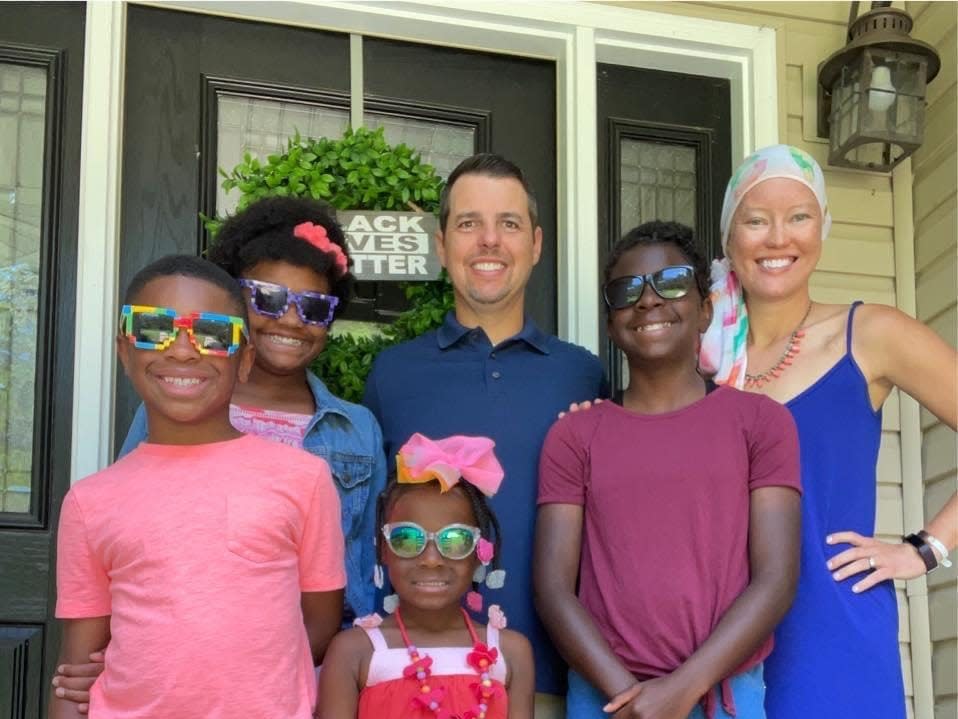Like Kate Middleton, I had to tell my kids I had cancer. I let them ask questions and asked for their help so they felt included.
When I got breast cancer, after processing my diagnosis for myself, I had to tell my four kids.
I didn't want to keep it a secret, and I told them they could ask questions.
Telling them allowed them to feel included in the process and brought us all closer.
My four children were eight, six, four, and 10 months old when I learned I had breast cancer. I abruptly went from a mom to a mom with cancer. I knew that I would tell my kids the truth. The big question was, how?
The first thing I did was process the news for myself. My first response was denial and disassociation. These quickly gave way to panic. Like many who hear the news that they have cancer, I was fearful. What if I died, leaving my children motherless?
Time doesn't heal all wounds, but it certainly can help. I went to many appointments, learned more about my breast cancer type and stage, and prepared to make the decision between getting a lumpectomy or a mastectomy. It was during this decision time that I revealed to my children that I had breast cancer.
I didn't want to keep my cancer a secret
Understandably, it was difficult for me to use the C-word. I'd been hearing it so much, and while I was learning to accept my diagnosis, I decided to use a rather childish term with my children to introduce the concept: boo-boo. I talked to each of them, calmly and confidently, and said that I had a boo-boo in my breast called cancer. I told them that the best thing to do was to remove it. I chose to have a bilateral mastectomy.
I knew it was best to be honest with my kids, both in that moment and with each future conversation. I believe that secrecy breeds fear. Instead, I wanted to foster an environment of safety and transparency.
My oldest had questions. My middle kids were quiet. The baby had no idea what was coming. I was heartbroken that there would be a solid month of not picking her up and cradling her in my arms, which my doctors told me was the recommended time to avoid lifting anything over five pounds. She wouldn't understand. We encouraged the kids to ask whatever they wanted, as well as told them they'd get to take turns hanging out with me in my room and watching movies.
Once we scheduled the surgery, I talked to my kids again. I explained to them that I was having a "bye-bye boobies" surgery and that I had to follow some rules after. I wanted them to feel included, but I would also need a few things about our daily lives to change during my recovery.

I told them that I would need them to be very careful and not be "silly" around me, which meant doing things like wrestling or jumping. I would also need them to be my "helpers" and grab a drink or food for me, for example. I wouldn't be allowed to pick up anything over a couple of pounds or lift my arms above my head, so I would need help from the older three to look after their baby sister.
I remember my oldest two kids drawing me pictures prior to my mastectomy, with messages written across the top. They wrote things like, "I love you, Mommy," and, "I hope you feel better." It was beautiful and hopeful to watch them process their feelings in this way.
As hoped-for and encouraged, after my surgery, the kids stepped in. They checked in on me often, as well as helped as much as they could. I think the ongoing communication brought them comfort and reassurance that I was going to be OK.
When I got cancer for a second time, I was honest with them again
Unfortunately, three and a half years later, I had a breast cancer recurrence in my chest wall. This time, I had three more surgeries, 12 weekly chemo infusions, 33 rounds of radiation, and 12 months of a targeted anti-cancer drug. Once again, I told my kids I had cancer, checked in with them often regarding their feelings, and made the process a family affair.
Cancer is a scary word, one no parent wants to discuss with their kids. However, I found that by being honest with my children, making sure they understood all feelings are welcomed and valid, and including them, we all came out of this journey stronger and more connected than ever.
Read the original article on Business Insider


